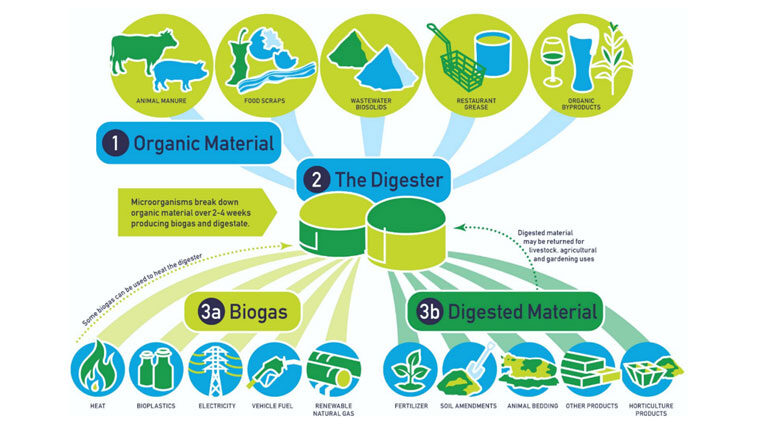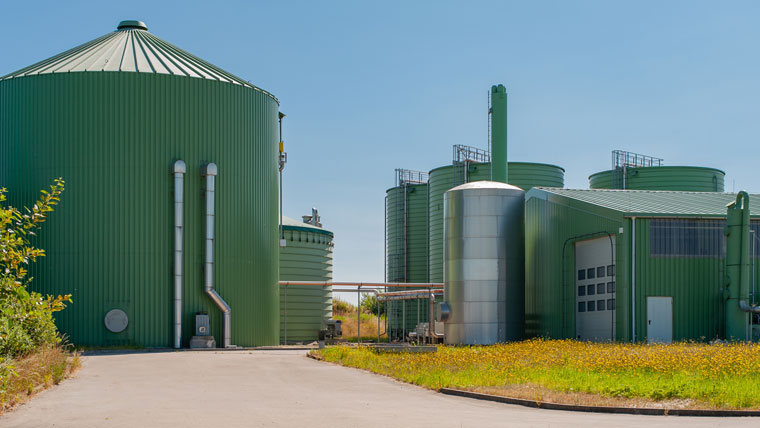As our global climate warms, communities worldwide continue to experience prolonged heat waves with record-breaking temperatures, more extreme wildfires and droughts, and rising sea levels.
With the passage of the Inflation Reduction Act (IRA) of 2022, the U.S. is reestablishing itself as a global leader in addressing the primary cause for climate change: our carbon emissions. The IRA of 2022 authorizes $369,000,000 to combat climate change with investments in transportation, water, and energy among other programs, that will reduce greenhouse gas (GHG) emissions. Mead & Hunt is well-positioned to help our municipal, industrial, and private clients examine opportunities to take advantage of these investments as they focus on reducing their carbon footprint.
Mead & Hunt is currently influencing waste reduction procedures and advancing technologies that reduce GHG emissions. Together, these sustainability practices provide incentives for our clients to redirect organic waste from expensive landfilling and utilize the biomass waste streams to produce Renewable Natural Gas (RNG). This can then be used to power industrial facilities, buildings, and transportation resources.
Creating energy from organic waste is not new, but technologies have improved such that current processes no longer produce heat, ash, and gas (including dioxides). We have made a foundational change to capture methane (CH4), which accounted for 11% of our 2019 greenhouse gasses and is 86 times more potent as a GHG than CO2 over two decades. If Americans diverted a single ton of organic waste daily from the 2 billion tons produced daily, we could reduce methane gas equivalent to 6.2 tons of carbon dioxide (CO2). Therefore, one of the best ways to address climate change is to prevent or utilize methane emissions.

Most states have instituted a Renewable Portfolio Standard (RPS) and some have set 2030 renewable energy goals. California, New York, and four New England states have laws banning large quantities of organic waste from landfills. California’s Senate Bill 1383 requires statewide organic waste recycling and surplus food recovery to combat the climate crisis. These regulations drive demand for renewable electricity generation. To be successful, the U.S. needs to increase renewable energy production by 50%. The production of RNG from organic waste helps to reduce GHG emissions by producing biogas from methane to produce clean energy. We are seeing more government programs that invest and offer incentives toward advancing biogas technologies and expanding its contribution to meet RPS and other energy goals.
What is Mead & Hunt doing to help?
As the U.S. population and economy grow, so does production of both solid waste and wastewater. Yet landfill space is becoming ever scarcer, and water quality standards are becoming stricter. Traditional waste disposal methods are significant GHG producers. This combination of factors has created strong demand for alternative waste treatment systems. In 2022, Mead & Hunt merged with Symbiont, an engineering, procurement, and construction (EPC) firm to offer enhanced services to clients and expand our geographic and market reach, specifically in the areas of water, renewable energy (biogas), and food and beverage.
Implementing a waste-to-energy program requires equipment selection, an experienced team of professionals, as well as modeling, environmental, permitting, engineering design, procurement, and construction experience. Our team has completed more than 100 projects, most with landfills, that produce 245 megawatts to provide supplemental electrical needs—or the ability to operate in full island mode—during a power outage. We help our clients establish a mutually beneficial waste-to-energy relationship through a variety of feed substrates for biogas production, including:
- More than 75 biogas anaerobic digestion projects: beverage, food, manure, combined waste
- Waste to energy with landfills and municipal solid waste digestion
- Green waste digestion
- Wastewater sludge conversion to biogas/RNG/compressed natural gas (CNG)
What we do today will not prevent the impacts climate change has on our world, but every little bit helps to lessen the impact on future generations. What are your renewable energy goals for the future? How will you minimize your waste, divert organic waste to be recycled, or recover surplus food? We can help you look for incentives to rouse an initial investment that can provide a good return for your business and the planet.
To request a copy of our White Paper: Greenhouse Gas Reduction and the Market for Renewable Gas Technologies, please email Kirk Kusick, Marketing Manager.


